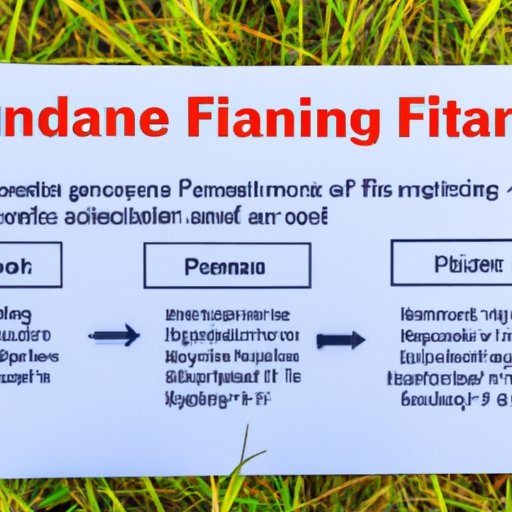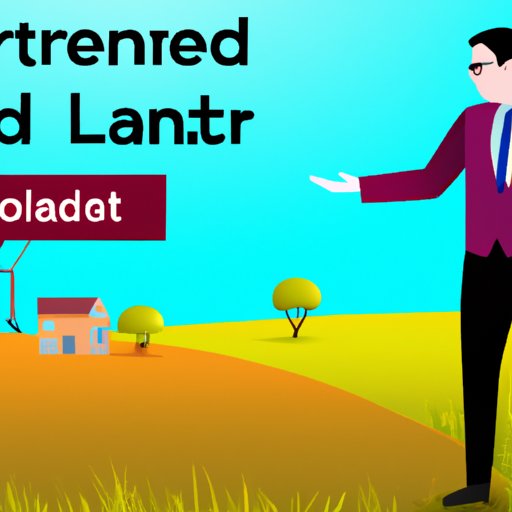Introduction
Owner financing land is a type of real estate transaction that involves the seller providing financing to the buyer for the purchase of a property. In this arrangement, the buyer pays the seller in installments over time, rather than taking out a loan from a bank or other lending institution. This type of transaction can be beneficial for both buyers and sellers, though it does come with risks and challenges that must be considered before entering into an agreement.
The purpose of this article is to provide an in-depth guide to understanding, negotiating and structuring an owner financing land agreement. We will discuss the key terms to know, the advantages and disadvantages of owner financing land, tips for finding the right property, and how to structure an agreement. By the end of this article, you should have a better understanding of how owner financing land works and how to navigate the process.
Explaining Owner Financing Land: What is it and How Does it Work?
Owner financing land is a type of real estate transaction where the seller provides the buyer with financing for the purchase of a property. This means that instead of the buyer taking out a loan from a bank or other lending institution, they will make payments directly to the seller. The seller will typically require a down payment and then the buyer will pay the remainder of the purchase price in installments over time, often with an interest rate attached.
The steps involved in an owner financing land transaction are fairly straightforward. First, the buyer and seller agree on the terms of the sale, which should include the purchase price, the length of the agreement, and the interest rate. Once these details are finalized, the buyer will usually make a down payment and the seller will transfer ownership of the property to the buyer. The buyer will then begin making monthly payments to the seller, with the entire purchase price due at the end of the agreement.

A Guide to Understanding Owner Financing Land
Before entering into an owner financing land agreement, it is important to understand the key terms and concepts involved. Knowing the advantages and disadvantages of this type of transaction can help you decide if it is the right option for you.
Key Terms to Know
When discussing owner financing land, there are some key terms that you should be aware of:
- Purchase Price: This is the amount of money the buyer agrees to pay the seller for the property.
- Down Payment: This is the initial payment made by the buyer to the seller at the start of the agreement.
- Interest Rate: This is the rate of interest that the buyer pays the seller for the loan.
- Loan Term: This is the length of time that the buyer has to repay the loan.
- Default: This occurs when the buyer fails to make their payments and the seller takes back possession of the property.
Advantages and Disadvantages of Owner Financing Land
Owner financing land can be a beneficial arrangement for both buyers and sellers. For buyers, it can allow them to purchase a property without having to take out a loan from a bank. It can also be a good option for those who may have difficulty getting approved for a traditional loan due to bad credit or other financial issues. For sellers, it can be a way to get paid faster and avoid having to wait for a buyer to get approved for a loan.
However, there are some drawbacks to this type of transaction. Since the seller is providing the financing, they will likely require a higher interest rate than what a bank would charge. Additionally, the seller will be taking on more risk because they are not guaranteed to get their money back if the buyer defaults on the loan. For these reasons, it is important to weigh the pros and cons carefully before entering into an owner financing land agreement.

How to Negotiate an Owner Financing Land Deal
Once you have decided that an owner financing land agreement is the right option for you, there are several strategies you can use to successfully negotiate a deal. Here are a few tips for getting the best terms possible.
Strategies for Successfully Negotiating an Owner Financing Land Deal
- Be prepared: Before beginning negotiations, make sure you have done your research and are familiar with the market value of the property and current interest rates.
- Be flexible: Be willing to compromise on certain aspects of the deal in order to reach an agreement that is mutually beneficial.
- Be reasonable: Make sure the terms you are proposing are fair and realistic.
- Be patient: Negotiations can take time, so don’t rush the process.
Tips for Overcoming Common Challenges
- Negotiate a lower interest rate: If the seller is asking for a higher interest rate than what you are comfortable with, try to negotiate a lower rate.
- Offer a larger down payment: By offering a larger down payment, you can demonstrate to the seller that you are serious about the deal and reduce their risk.
- Extend the loan term: Extending the loan term can help you lower your monthly payments and make the agreement more manageable.
Tips for Finding the Right Owner Financing Land
Finding the right property for an owner financing land agreement is essential for a successful transaction. Here are some tips for finding the right property.
Researching Potential Properties
It is important to do your research before committing to a property. Make sure to look at a variety of properties in different locations and compare prices and features. This will give you a better idea of what is available in your area and help you narrow down your options.
Knowing What to Look for in a Property
When looking for the right property for an owner financing land agreement, it is important to keep in mind the following factors:
- Location: Consider the location of the property and how it may affect its future value.
- Condition: Make sure to inspect the property thoroughly to ensure it is in good condition.
- Price: Make sure the purchase price is reasonable and in line with market values.
- Terms: Make sure the terms of the agreement are fair and mutually beneficial.
The Benefits of Investing in Owner Financing Land
Investing in owner financing land can offer several advantages for buyers and sellers. Here are some of the potential benefits of investing in owner financing land.
Tax Benefits
For buyers, investing in owner financing land can provide tax benefits. Interest payments on the loan may be tax deductible, which could result in significant savings for the buyer.
Potential for Higher Returns
For sellers, owner financing land can offer the potential for higher returns. By charging a higher interest rate than what a bank would charge, the seller can increase their profits.

How to Structure an Owner Financing Land Agreement
Structuring an owner financing land agreement correctly is essential for a successful transaction. Here are some key considerations when structuring an agreement.
Components of an Owner Financing Land Agreement
An owner financing land agreement should include the following components:
- Purchase price: This is the amount of money the buyer agrees to pay the seller for the property.
- Down payment: This is the initial payment made by the buyer to the seller at the start of the agreement.
- Interest rate: This is the rate of interest that the buyer pays the seller for the loan.
- Loan term: This is the length of time that the buyer has to repay the loan.
- Default clause: This outlines the consequences if the buyer defaults on the loan.
Important Considerations When Structuring an Agreement
When structuring an owner financing land agreement, it is important to consider the following:
- Down payment amount: Make sure the amount of the down payment is sufficient to cover any potential losses if the buyer defaults on the loan.
- Interest rate: Make sure the interest rate is fair and in line with current market rates.
- Loan term: Make sure the loan term is reasonable and allows the buyer enough time to pay off the loan.
- Default clause: Make sure the default clause is clearly defined and outlines the consequences if the buyer defaults on the loan.
Conclusion
Owner financing land is a type of real estate transaction that can be beneficial for both buyers and sellers. However, it is important to understand the key terms and concepts involved, as well as the advantages and disadvantages, before entering into an agreement. Additionally, it is important to know how to negotiate and structure an agreement in order to get the best terms possible.
By following the tips outlined in this article, you should now have a better understanding of how owner financing land works and how to navigate the process. With the right knowledge and preparation, you can successfully enter into an owner financing land agreement that is mutually beneficial for all parties involved.
(Note: Is this article not meeting your expectations? Do you have knowledge or insights to share? Unlock new opportunities and expand your reach by joining our authors team. Click Registration to join us and share your expertise with our readers.)
